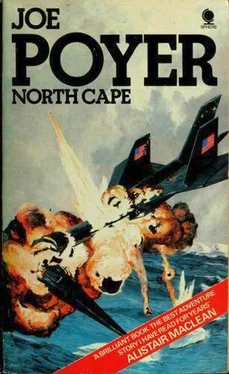Fifty-to seventy-foot waves, whipped to a froth by the Arctic gale, marched down from the Great Barrier across two hundred miles of open sea. What was possibly the worst Arctic storm fir more than thirty years hunted through the desert wastes of the Arctic in a cyclonic storm of unbelievable proportions.
Formed from a katabatic storm somewhere on the Greenland Icecap and fed by a smaller low pressure area of relatively warmer, moister air, the two centers had met; the colder, moist, and therefore heavier air had settled down onto the glacier. The Greenland Icecap rises from the coast to nearly two thousand feet in the interior. The settling cold air had merely flowed down the eastern side of the icecap, encountered a low-pressure area off the foggy coast into which it rushed, picked up more moisture and speed, and spewed itself out into the Greenland Sea as a full-scale cyclone. Now, the storm, fully built and overpowering everything in its path, was sweeping in a huge curving arc up into the Norwegian and Barents seas. Lieutenant Commander Peter Folsom swiveled on his high seat as-Captain Henly Larkin, commanding officer of the RFK, came onto the bridge, peered out through the driving wipers, and shuddered. Folsom indicated the coffee pot and grinned as Larkin poured his famous oversized cup and carefully took a sip of the steaming black liquid as he came over to stand by Folsom.
“How’s she look, Pete?”
“A real ball coming up, Captain. The wind is about seventy-five knots and rising. The barometer is 28.52 and still falling — fast. We’ve had a four-tenths drop in the last half hour.”
“Anything coining in over the weather channel?”
“Thule’s forecasting what they call ‘heavy weather’ again. They claim that little breeze two days ago was only a prelude. At least 125-knot winds, possibly higher for this area in the next twenty-four hours.”
Folsom passed over the sheaf of flimsies that had come in since Larkin went off watch four hours before. Larkin took them over to his console and settled into the high stool with a muffled sigh of weariness and began to read. The picture was not good. Arctic cyclones are not to be fooled with. Any shipping without dire need steered well clear of such storms and even submarines moved down to the two-hundred-foot level to avoid the angry currents and crosscurrents churned up by the furious winds above. Larkin read on. The volume of meteorological information that had been gathered, collated, and disseminated in the past four hours was far more complete than that available to commercial shipping. In addition to the reports from the civilian agency weather satellites, the Department of Defense maintained a series of its own, devoted exclusively to gathering weather information strictly for the military. Larkin therefore had available to him more data about the storm and more accurate projections as to its future course than did commercial shipping. But Larkin had one other thing that commercial captains did not have — strict orders to maintain station in the Barents Sea at all costs, short of losing his ship. However, if it should become clear to Larkin that he was about to lose his ship, it would probably be too late to save her.
Larkin rubbed his eyes aid swiveled around to face Folsom at the adjacent panel. “Ah… my aching back. How long till contact?” He peered at his watch and checked it against the chronometer readout above his command console.
“Five minutes to go. Communications tells me everything is set. There shouldn’t be any trouble on this end.” Folsom slid out of the seat and walked over to the forward ports and stared out through the revolving screen into the wind-and wave-filled night. The ship crested another wave, tipped, slid and smashed again into the Arctic seas. Folsom hung onto the coaming, riding easily with the motion of the ship, and winced involuntarily as solid spray rattled like grapeshot against the tempered glass.
“Thule also said that we can expect snow toward the end. It seems to be one of those blasted Greenland storms, and when this one finally spilled over the edge it found a lowpressure area along the coast and kept coming… bringing everything in its path with it.” Larkin merely grunted as he continued to stare thoughtfully into the storm. His mind was churning with dozens of lines of thought, all ending at one consideration… the safety of the ship. Fourteen years of sea duty in every ocean of the world had taught him one certain lesson: the sea can never be trusted. Even the weather satellite system, with its computerized data reduction processes, was not to be trusted completely. There were too many unknowns, too many variables in the billions of cubic miles that comprised the ocean of air and the ocean of water that always obscured the pattern. Larkin had weathered both Mid-Atlantic hurricanes and South Pacific typhoons. He had seen a destroyer almost turned turtle in a South China Sea typhoon off the coast of Taiwan and rode out the Pacific typhoon of ’57 in a light cruiser. If nothing else, Larkin had immense respect for the sea. He was worried about this storm. If the predictions were right, it was going to get an awful lot worse before it got better. And, he remembered, it was here in the Barents Sea in 1942 that two lend-lease British destroyers had been sunk by just this same kind of Arctic cyclone. The RFK was a much more powerful and stouter ship than those two World War I tin cans—“tin cans” built in a day when they were really not much more than that — but still, every ship, every crew had its limit. One small mistake could be extremely fatal.
He turned to survey the bridge quickly, noting each station manned with all of the ship’s electronic and visual eyes and ears tuned outward to register the slightest alteration in the storm or the condition of the sea. Radar units quested ceaselessly to pinpoint the most insignificant object revealed by an instant’s break in wave or cloud that might turn out to be the conning tower of a submarine or rocket-loaded fighter bomber. For all intents and. purposes, the Barents Sea, edging the northern coasts of the Union of Soviet Socialist Republics as well as Norway and Finland, was enemy water. The panel above the ECM — electronic countermeasures — console was lit a bright red, indicating that the highly secret sonar, radar, and infrared jamming devices were in full operation. Any contact with a Soviet vessel — or that of any nationality — would be a matter of pure, blind luck in these seas, but Larkin was not one to trust luck any more than he trusted the sea.
“Helmsman, course and speed,” he called out. Folsom glanced at him for a moment, then went back to staring out the ports.
“026° at sixteen knots sir.”
Larkin considered a moment. “Sixteen knots against these head-winds, not bad. Let’s cut her back to ten. I don’t want to carry any more pressure on that bow patch-up than we absolutely have to have.”
Folsom nodded agreement and called out the changed speed, then ordered communications to make the proper correction in the rendezvous location and time and get it off. As he finished talking, the screen door swung open with a bang and a furshrouded figure stumbled in, followed by the banshee shriek of the wind. A howled chorus of “shut the door” rose from the bridge crew as they swung around as one man from their consoles to glare at the snow-covered apparition. The hatch was jerked from the man’s grip by the wind and thudded back against the stops, then just as perversely swung the other way and slammed shut, abruptly ending the noise. Lieutenant Commander Joel Bridges leaned wearily against the hatch and stripped the Arctic mask from his face with a great deal of care. The mask and his nylon all-weather gear were coated with an inch of solid ice. Bridges worked the zipper on the parka loose and pulled it down. The parka then fell away of its own volition and the ice coating dumped onto the deck plates in thick chunks.
Читать дальше












